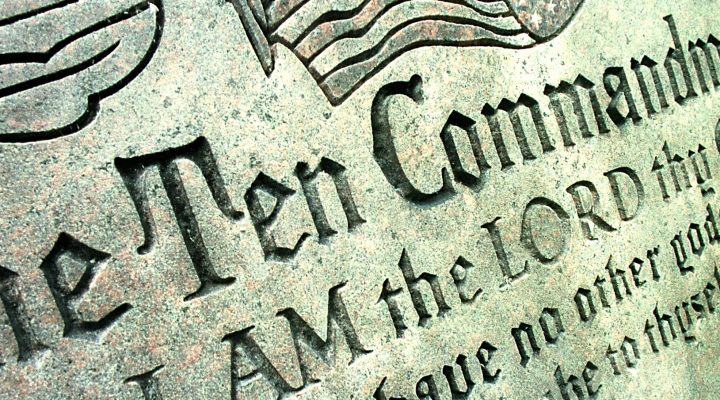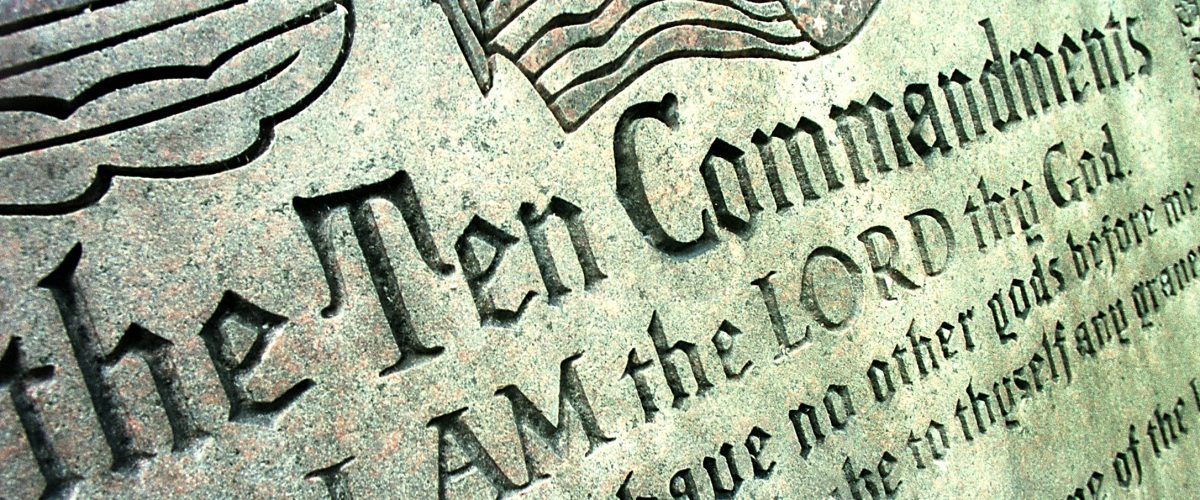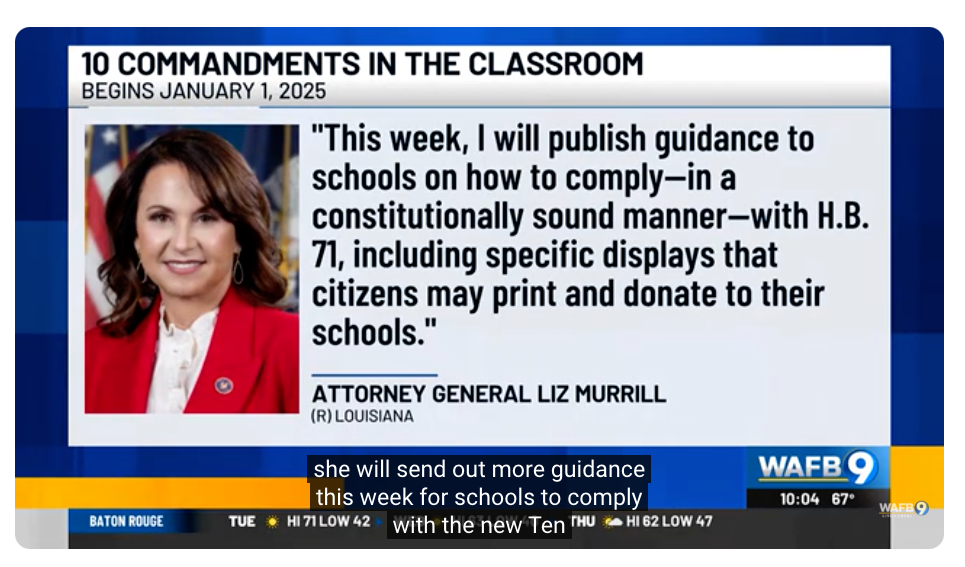All Louisiana school districts must comply with a recent federal court ruling barring classroom Ten Commandments displays despite contradictory guidance from a state official, civil rights groups said in a Jan. 6 letter to district superintendents.
Three days earlier, Louisiana Attorney General Liz Murrill instructed districts to implement House Bill 71, a 2024 law requiring displays of the Decalogue in public classrooms by the beginning of this school year. While the law was ruled unconstitutional in November and is still under appeal, Murrill claimed the decision applies only to the five districts specifically named in Rev. Roake v. Brumley.
“I have issued guidance to our public schools regarding compliance with Louisiana’s Ten Commandments law, HB-71. As I have repeatedly said, HB-71 is plainly constitutional because there are constitutionally sound ways to implement it,” she said.
But the four civil rights organizations representing the parent and student plaintiffs in the lawsuit warned the state’s remaining 67 districts must honor the Nov. 12 U.S. Fifth District Court of Appeals ruling blocking HB-71 upon further appeal.
“This means that there is no way for school districts to implement the statute in a constitutionally permissible manner,” attorneys for Americans United for Separation and State, the Freedom from Religion Foundation, the American Civil Liberties Union and ACLU of Louisiana warned in their letter.
From the outset, the attorney general, Gov. Jeff Landry and state legislators have claimed the mandated displays are not religious but historical in nature because they include the Declaration of Independence and other historic documents. Murrill based her recent instructions to school districts partly on the same argument.
“My guidance letter explains as much and includes four specific displays, as well as a draft resolution that schools may use to adopt this guidance. I look forward to working with our schools and continuing to defend HB-71’s constitutionality,” she said.
But that argument has yet to pass muster in federal court, the attorneys responded. “As the district court explained, ‘regardless of what iterations of the displays (defendants) are able to conjure up for purposes of their briefing, the fundamental requirements of the act mandate that the displays occur in a specific time, place and manner that contravene the First Amendment.’”
The districts not party to the ongoing litigation and therefore “not technically subject” to the court’s injunction nevertheless are obligated to respect the constitutional rights of students and their families, their letter added. “Because the U.S. Constitution supersedes state law, and because a federal district court has held HB-71 to be facially unconstitutional under the First Amendment, public-school officials may not comply with it.”
“The AG’s guidance is grossly misleading, and schools that follow it will be playing with fire.”
Murrill also promised legal representation to districts that erect the displays in classrooms. “If a school implements HB-71 in accordance with this guidance — and is later sued over its implementation — my office will represent that school in addition to defending statewide officials and HB-71 as permitted by law.”
But plaintiffs’ attorneys cautioned school officials to think twice before complying with the law based on Murrill’s promised legal backing, especially because she has not agreed to pay the legal fees of districts that lose in court: “The AG’s guidance is grossly misleading, and schools that follow it will be playing with fire. School districts should refrain from implementing HB-71 at this time and reject the AG’s invitation to go against a federal district court ruling. It is the only responsible and lawful course of action to ensure that students’ and families’ constitutional rights remain protected.”
The case dates to June 19 when Landry signed HB-71 into law in the stated hope it would be legally challenged and eventually wind up before the conservative U.S. Supreme Court. He also expressed optimism other states would follow Louisiana’s lead.
Less than a week later, a multi-faith group of nine adults with children in the public schools filed suit in Louisiana federal court seeking an injunction against the law. Named in the suit were state Superintendent of Education Cade Brumley, members of the state Board of Elementary and Secondary Education and the East Baton Rouge, Orleans, St. Tammany and Vernon school districts.
“The law violates longstanding Supreme Court precedent and the First Amendment. More than 40 years ago, in Stone v. Graham, the Supreme Court overturned a similar state statute, holding that the First Amendment bars public schools from posting the Ten Commandments in classrooms. No other state requires the Ten Commandments to be displayed in public schools,” the plaintiffs said at the time.
Oral arguments before the appellate court will be the next phase of the case, and are scheduled for Jan. 23.
Related articles:
Court strikes down Louisiana Ten Commandments law
Baptists oppose Louisiana Ten Commandments bill
If you want to post the Ten Commandments in schools, you ought to learn more about them | Analysis by Rick Pidcock



